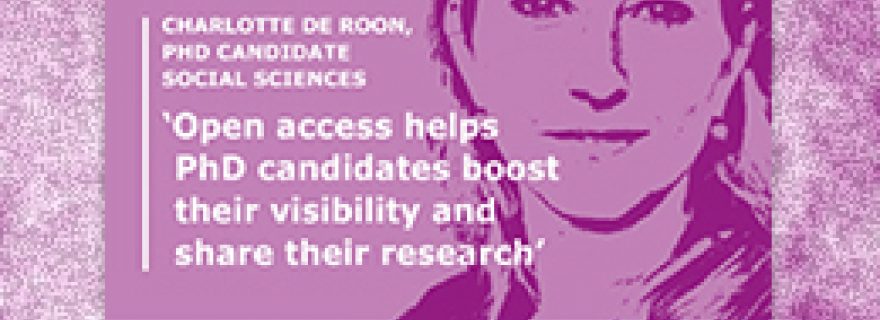How Open Access may boost a promising career
As part of its “Open up to open access” campaign to raise awareness about the deals with publishers mentioned in earlier posts, the VSNU interviewed two Leiden PhD candidates on their views on how to promote Open Access publishing among your researchers.
As part of its “Open up to open access” campaign to raise awareness about the deals with publishers mentioned in earlier posts, the VSNU interviewed two Leiden PhD candidates on their views on how to promote Open Access publishing among your researchers.
The Special open access campagne (15-05-2017) presents such a promising impression on the way our future colleagues view the changes taking place in the current publishing culture, that I would like to share it on this blog.
Young PhD candidates and open access
Gareth O’Neill and Charlotte de Roon are two young PhD candidates who recognise the importance of open access. The VSNU spoke with them in connection with the open access campaign. According to Charlotte, open access offers PhD candidates a perfect opportunity to raise their profiles and for researchers, it’s a way to let others know what you are working on. ‘Besides the possibility of promoting yourself and your work, open access publication makes your research easier to find – meaning it will be read by more people. More than that, it strikes me as only logical that publicly-funded research be made available to everyone.’ Like Charlotte, Gareth endorses the societal benefit of open access. He feels it is important to have free access to academic publications and is eager to contribute to that goal. After all, it’s a two-way street. He is urging other PhD candidates to choose open access: ‘get the facts and just go for it!’
Gareth has spent a lot of time talking to young researchers. From these conversations, he has learned that many researchers are still largely in the dark when it comes to open access publishing. He feels greater awareness of open access is needed, along with increased support for young researchers. Charlotte says the same thing. ‘Many PhD candidates simply aren’t aware of their options in the area of open access. Their familiarity with open access depends largely on the information they’re given by the university.’ For example, Gareth points out, many PhD candidates are unaware that there are other ways to publish open access besides in journals. Making your own results public in repositories is another way to contribute to the accessibility of research findings. Gareth is calling for increased provision of information about open access. This could be achieved by offering courses or online modules, for instance. ‘PhD candidates want to publish open access, sure, but the question is: how? And what does that mean? You could also promote awareness by ensuring the open access logo and the open access button are used more prominently, in order to draw more attention to open access.’
Both Gareth and Charlotte assert that the possibilities of open access deserve increased publicity. In fact, Charlotte would like to see open access being promoted in the supervisory process as well. The professors supervising PhD candidates could use that contact to point out the option of open access and its importance to society. Professors often co-author articles with their candidates, so they can play a major role in drawing attention to open access possibilities. Charlotte feels that graduate schools have a part to play here as well. As the point of contact for administrative aspects, support and degree programmes, they could alert PhD candidates to the possibilities of open access. Gareth concludes by saying that the guidelines for open access could stand to be more transparent, too. Universities must be clear in expressing what they expect from their own researchers. He adds that when universities’ expectations of PhD candidates increase, this should be taken into account in the candidates’ workload.
Gareth O’Neill is affiliated with the Leiden University Centre for Linguistics (LUCL) and is conducting his doctoral research on the expression of emotions and cognition in the Irish language. In addition to writing his thesis, Gareth serves as a board member of the PhD candidates Network of the Netherlands (PNN) and has just been elected chair of Eurodoc, the European federation of national organisations for PhD candidates and young researchers, for the 2017-2018 academic year. Gareth is also a member of the European Commission’s ‘skills under open science’ working group. As part of those efforts, he took part in a survey conducted among young researchers. The results of this survey will be published later this year.
Charlotte is writing her doctoral thesis on the role of political youth organisations in the Netherlands and is also one of the faces of the open access campaign.


